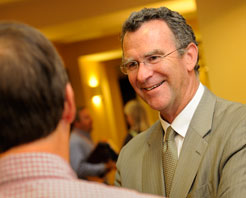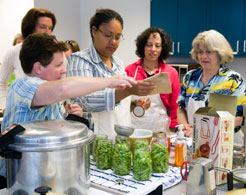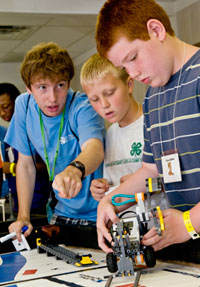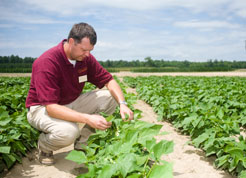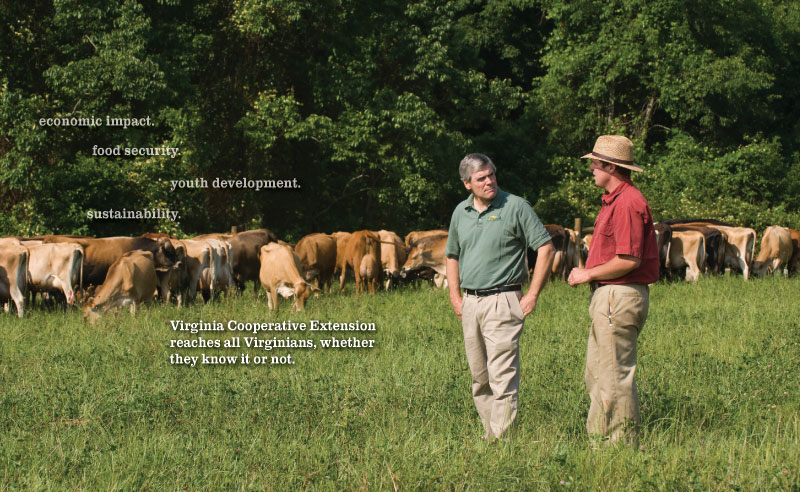 |
|
||||||
|
|
|||||||||||||||||||||||||||||||||||||||||||||||||||||||||||||||||||||||||||||||||||||||||||||||||||||||||||||||||||||||||||||||||
|
21st-century Extension
by MICHAEL SUTPHIN '06
"When Extension began nearly 100 years ago, its purpose was to help people take research developed at a university and other places and put it into practice on the land and in the home," said Edwin Jones, director of Virginia Cooperative Extension. "Can we still do that today? I believe so." An evolving mission Since the Smith-Lever Act in 1914, Virginia Cooperative Extension—a partnership of Virginia Tech and Virginia State University (VSU)—has grown to include a network of faculty at each university, 106 county and city offices, 12 agricultural research and Extension centers, and six 4-H educational centers. For decades, Extension focused its mission on helping farmers and addressing economic problems in the home, but now its reach extends to an array of economic, environmental, and social concerns. Recent decreases in federal and state public resources for Extension programs have caused administrators to rethink what programs are offered and how they are delivered. Even so, Jones (M.S. fisheries and wildlife '79, Ph.D. '83) said the organization has two advantages over other state agencies. First, Extension focuses on education, influencing behavior on, say, nutrition and obesity rather than addressing only the aftereffects. Second, Extension transfers research-based knowledge from land-grand universities directly to Virginia residents. Take, for example, the Virginia Potato Disease Advisory. Developed by Extension agents, the advisory relies on research at Extension sites to issue weekly bulletins sharing fungicide recommendations and information about potato diseases. In 2010, Eastern Shore potato growers saved $300,000 through reduced fungicide applications by using recommendations from the advisory. The issue is one of many that Extension agents have helped to address. From prevention of foodborne illnesses through food-safety training to leadership development through its 4-H programs, Extension has evolved to meet the needs of Virginians in the 21st century. Despite reaching more than 1.8 million Virginians in 2010, Extension has seen its one-on-one interactions with members of Virginia communities come into question and make headlines in recent years. In the four years from fiscal year 2008 to fiscal year 2012, Virginia Cooperative Extension and the Virginia Agricultural Experiment Station have seen a cumulative reduction of $10.3 million in state funds, or about 15.9 percent less than the 2008 amount. In fall 2010, Extension responded to a General Assembly request for a new strategic plan and a restructuring proposal to reduce costs yet maintain a local presence throughout the commonwealth. By early 2011, as lawmakers and the university fielded public reaction, the organization withdrew its proposed restructuring plan. Extension leaders refocused on listening to stakeholders and partners and gathering input about how, with the current level of resources, Extension can best deliver high-impact programs that align with the needs of its clientele. Jones said Extension is searching for unique ways to increase its capacity, including collaborative training programs with other states and the use of new technology, while maintaining a visible presence in communities. Pooling resources To address the decline in public resources, Virginia Cooperative Extension has taken new approaches and sought out partnerships to make its programs more effective. The organization's four program areas—agriculture and natural resources, family and consumer sciences, 4-H youth development, and community viability—work in tandem to solve complex issues, such as protecting natural resources or promoting local foods. "To deliver the important, comprehensive programs needed to address the complex issues that we have, those program areas have to work together," Jones said. "The local foods issue is a great example because it cuts across all of our areas programmatically, from youth development to production agriculture, human nutrition, and community viability." Extension professionals at both universities work statewide in order to provide seamless programming and services to meet the needs of Virginians, according to Jewel Hairston, interim dean for agriculture and the 1890 Extension administrator at VSU. "I'm proud of the excellent working relationship between Virginia Tech and Virginia State University, especially within Extension," said Hairston. "VSU's programs with limited-resource farmers and families, as well as our work [in] aquaculture, small ruminants, vegetables and small fruits, child and human development, family financial management, and [more] complement the work being done by Virginia Tech." Nationwide, land-grant universities are working together and finding ways to support each other with programs and resources. "I think most land-grant universities across the country are facing similar challenges," said Kirk Schulz (chemical engineering '86, Ph.D. '91), who, as president of Kansas State University, the land-grant institution in Kansas, has a unique perspective on K-State Research and Extension services. "Our audience and their needs are more diverse today, and overall budgets are being cut. Like Virginia Tech, as a land-grant university, generating knowledge that's paired with outreach and engagement is a part of our heritage and mission at K-State. It's something that's very important to us and something we will continue to value." Such heritage is as important as ever, Schulz said. "Helping people improve their lives with research-based knowledge won't ever lose its relevancy. With the vast discoveries that researchers are finding, it's important that we capitalize on the benefits of these findings by bringing them to the people and industries that can use them." Whether partnering with large agricultural associations, such as the Virginia Agribusiness Council or the Virginia Farm Bureau, or educating local communities, Extension has the unique ability to bring together those from all sides of an issue. "Our greatest strength—and one that we do very, very well—is our ability to bring different perspectives from various audiences into discussions," Jones explained. "We bring the latest information we have, without a stake in the issue." Training future leaders Perhaps nowhere is Extension's dexterity in disseminating knowledge more visible than in its 4-H programs, which teach youth about a wide range of issues, from agribusiness to public speaking, all while honing their skills as future leaders. "Virginia 4-H provides hands-on learning experiences for youth at all ages and addresses a number of societal issues, from raising the next generation of community and civic leaders, to teaching about nutrition and physical fitness as a way to address the growing problem of childhood obesity, to encouraging children and teens to pursue careers in the science, technology, engineering, and mathematics [STEM] fields," said Cathy Sutphin, associate director of Virginia Cooperative Extension's 4-H youth development program. "Our programs not only change behaviors to ensure that Virginia's youth are productive members of society who contribute to their local communities, but also increase their academic performances, therefore, their economic potential." "The mission of 4-H is to build leaders and help them develop life skills. I believe that is exactly what 4-H has done for me," said Brandon Pierce, now a Virginia Tech senior majoring in agricultural and applied economics and Spanish. Pierce has served on the Virginia 4-H Cabinet, including one year as president; on the National 4-H Planning Committee; and as a camp staff member at the Airfield 4-H Center. "I've had the opportunity to work with many different groups of people. I've been able to connect to and learn from each group. The knowledge that I've gained has helped me to better my skills working with people, consequently strengthening my leadership skills," he added. Cameron Taylor, a Virginia Tech freshman economics major and president of the Virginia State 4-H cabinet, agreed. "4-H has, first off, taught me the proper way to lead. Power is not leadership; a leader may have power, but having power does not make a leader," he said. Taylor credits 4-H with giving him the opportunity to talk to state legislators, university deans, and corporate officials—experiences that he said helped him grow as both an individual and as a leader. Sharing knowledge When Extension agents first began offering their knowledge and expertise, the country's economic engine was agriculture, and the majority of its population lived in rural areas to work on the land. Today, farmers account for only 1 to 2 percent of the U.S. population, and more than half of Americans live in urban areas. Virginia is no different. New technologies and innovative approaches to production may have eliminated the need for a large farming population, but everyone still has a stake in agriculture, said Jones. Virginia Cooperative Extension invests its time and resources in all aspects of community food systems, whether showing a large agricultural operation in Southwest Virginia how to incorporate the latest integrated pest-management strategies, teaching Eastern Virginia residents how to grow their own community gardens, dealing with crop varieties or livestock programs, or addressing nutrition in schools and community centers.
• Extension's strong agriculture and natural resources programs sustain the profitability of agricultural and forestry production—Virginia's largest industry, with an annual economic impact of $55 billion—and protect the quality of Virginia's land and water resources. • The Virginia Quality Assured Feeder Cattle Program has consistently given Virginia beef producers higher prices compared to traditional livestock sales. Cash receipts for program participants are higher than weekly market values, creating an economic stimulus valued at more than $508,000 in 2010. • Extension agents developed the Virginia Potato Disease Advisory, which, in 2010, saved Eastern Shore potato growers $300,000 through reduced fungicide applications. • Thanks to Extension's forage-based nutrition management planning program, farmers in the Piedmont region of Virginia now use poultry litter for fertilizer. Because poultry litter costs less than commercial fertilizer, farmers saved an average of $42 per acre on fertilizer over a three-year period. • Extension addresses emerging family and consumer sciences issues, such as obesity and diabetes, and their associated costs. Virginia spent more than $1.6 billion on obesity-related problems in 2003—approximately 5.7 percent of the state's total medical expenditures. • Foodborne illnesses cost Virginia up to $23 million annually. Last year, Extension agents trained more than 375 food handlers on food safety and foodborne disease prevention. • Virginia's six 4-H educational centers, which provide hands-on educational experiences for more than 16,000 Virginia youth in summer and year-round camps, have a major impact on the commonwealth's economy. Employing staff, purchasing food and supplies, and making capital improvements account for more than $6.3 million annually. Formerly a writer for the College of Agriculture and Life Sciences, Michael Sutphin (communication '06) is now the public relations coordinator for the Virginia-Maryland Regional College of Veterinary Medicine. |
|
||||||||||||||||||||||||||||||||||||||||||||||||||||||||||||||||||||||||||||||||||||||||||||||||||||||||||||||||||||||||||||||||
|
|||||||||||||||||||||||||||||||||||||||||||||||||||||||||||||||||||||||||||||||||||||||||||||||||||||||||||||||||||||||||||||||||
|
Carl Stafford (left), an Extension agricultural and natural resources agent, visits with dairy producer Terry Ingram about forage management strategies.
|
|||||||||||||||||||||||||||||||||||||||||||||||||||||||||||||||||||||||||||||||||||||||||||||||||||||||||||||||||||||||||||||||||



